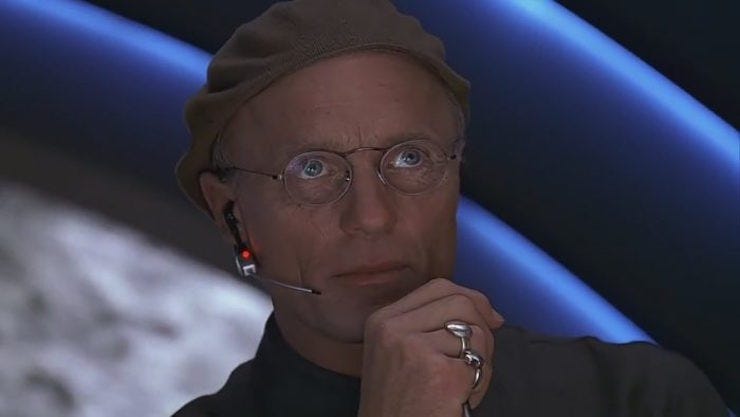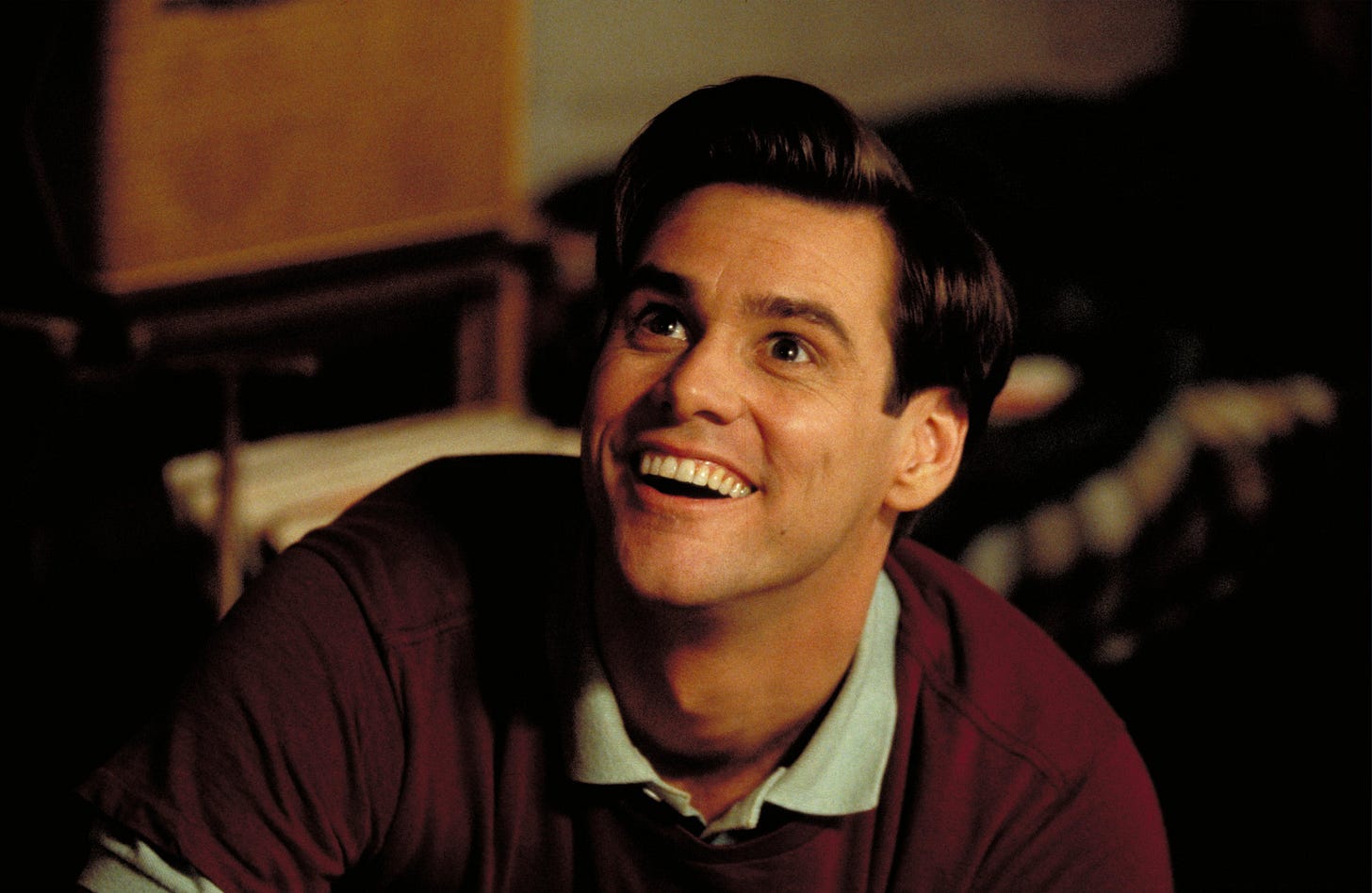1998 in Review: "The Truman Show"
"You can't get any further away before you start coming back."
On this, my umpteenth viewing of The Truman Show, I really locked in on the final exchange between Christof and Truman. Actually, one word in particular. That word was “goddammit.”
Truman stands at the door to the outside world. “Talk to me,” says Christof, urging Truman through a heavenly loudspeaker to stay in the world he has created for him. Truman remains mute, processing his new reality. “Say something,” he repeats with a little more urgency this time. He has just gotten done telling Truman how he has been watching him his whole life, and for the first time, we see love in Christof’s eyes and hear it in his warm, fatherly tone. Then it switches, and he snarls, “Well, say something goddammit, you’re on television!”
Did you ever make your father mad? Did you ever not really know he was mad until the word “goddammit” passed through his lips? It’s that thing where he was stifling his rage, and then he smiled through a “goddammit,” and all of a sudden you were a little bit scared. If he could curse at you, what else could he do? We never quite know when Truman decides for certain to walk through that door and embrace the uncertainty of the real world—the film chooses to value his privacy, something he has been long denied, in that most crucial moment—but I like to think it’s when Christof said “goddammit.” That’s when Christof lost him.
That moment—beautifully scripted by Andrew Niccol and thoughtfully performed by Ed Harris—reveals The Truman Show to be a classic Generation X movie. It’s about a guy who has spent the first years of his adult life working in an office because that’s what his father told him to do and is now deciding he might want something more in life. In this reading, Truman is Peter from Office Space, Neo in The Matrix, Steve Arlo in Zero Effect, and The Narrator in Fight Club. He is perhaps most like John Murdoch in Dark City, who also had a world created just for him, sailed a boat to the edges of his prison, and then broke through a wall of blue sky.
Of course, that’s just one reading of The Truman Show, which is built on one of those core concepts that’s ancient and prescient at once, and which lends itself to an endless array of interpretations. Maybe it’s just about being a teenager and trying to get away from home. Maybe, as my friend Jeremy insightfully posited, it’s about the limits of Evangelicalism. It’s almost definitely about reality television and the dangers of corporate personhood. I’m quite certain it predicted much about the internet, too, although I can’t quite put my finger on how (perhaps it’s the illusion that the whole world revolves around you). The Truman Show so perfectly encapsulated the anxieties of its era that it spawned an actual mental health disorder: Truman Syndrome, in which the afflicted believe they are being secretly filmed and everyone in their life is an actor.
The concept actually predates the film, and The Truman Show is not a wholly original creation (spoiler alert: nothing is). There was an ‘80s-era Twilight Zone episode built around a similar idea, and a 1959 Philip K. Dick novel with the same concept, minus the cameras. Still, The Truman Show is a singular object, a collision of strong artistic voices—director Peter Weir, writer Andrew Niccol, composer Burkhard Dallwitz, and star Jim Carrey—that come together to create a stirring, unforgettable, timely, and timeless work of visual art.
I love how it opens. It jumps right into its plot of Truman’s world unraveling, without bogging the story down with too much exposition, or giving us a normal day-in-the-life of its cheerful star. After a few sentences of explanation from Christof (this feels like a studio note, and I bet Weir would have preferred to skip it altogether), we see a light falling from the sky and nearly landing on Truman as he heads to work. As we’ll later learn, it’s not the first time Truman has been given a hint of the true nature of his world, but it’s a meaningful symbol of the start of his path towards liberation. Holding the light in his hands, he turns and looks at the sky, setting his imagination free in his vastness.
In these early scenes, Weir lets us know that we’ll mostly be watching Truman like one of his viewers. A vast majority of the shots are from the TV cameras that film his every move. They are hidden in objects, buried in the ground, even embedded on the buttons of actors’ clothes. As such, they often produce strange angles that hint at the dark, distorted underpinnings of his peaceful suburban existence. It’s Metropolis meets Fathers Know Best, and a brilliant choice by Weir that simultaneously upholds the reality of the film—this is what it would look like to people watching “The Truman Show” on their TVs—while also serving to further the story of Truman’s oppression and liberation.
Throughout the film, Weir holds a fascinating respect for “The Truman Show,” even as he condemns it. It would have been satisfying in an easy way if he vilified everyone involved in Truman’s imprisonment, but Weir has more empathy than that. In fact, you get the sense throughout that Weir has respect for what Christof has achieved. Perhaps it’s because they’re both directors—game recognizes game—but it adds a richness to the film that could easily have been missed. I think of the scene in which the production team contrives a tearful reunion between Truman and his “father,” who was written off the show years ago but has forced his way back in. We see Christof directing this live moment with true artistic prowess, using his knowledge of Truman, his artistic instincts, and his years of practice to create a cinematic moment that moves millions. Is it any wonder Weir has sympathy for him?
Weir also respects the art Christof has created. For most of The Truman Show, we’re watching The Truman Show—there are only a few scenes set outside Sea Haven—and ya know what? It’s a damn good show. We’re probably seeing it at its peak, as Truman’s unraveling heightens the drama considerably. But Christof and Weir go with it, and so do we, as the show skips through genre, morphing from a paranoia thriller, a comedy, an action movie, and even a shipwreck drama. In the few moments that Weir does step outside the show, he deepens our appreciation for its entertainment value, showing us the impact is has on its viewers: the bartenders at the Truman Show Bar, the old ladies watching it together at home, and the parking lot attendants happy to ignore their professional duties to keep up with Truman’s life. It would have been so easy for Weir to mock Christof or the suits or the audience—we almost expect him to—but he almost never does. Instead, he shows how everyone involved, from Christof to his second-in-command (Paul Giamatti) to the viewers who build their lives around the show, love Truman in their way.
The tone of wonder that he creates—aided by Burkhard Dallwitz’s anthemic score—is supported by a career-best performance by Jim Carrey, a meteoric star at the time who the film catches at exactly the right moment. The Truman Show was his first foray into drama, and when a comic star makes that move, there’s a narrow path to success: It always helps when they plate a character constrained by circumstance and eager to burst out. Bill Murray in Lost in Translation, Will Ferrell in Stranger than Fiction, and Adam Sandler in Punch-Drunk Love are all successful examples. It’s a savvy move, and it allows us to integrate our expectation of comic shenanigans into the narrative. When we see Jim Carrey as a buttoned-up insurance salesman in a painfully pleasant small town, we inherently want him to throw himself against the walls and burn that place to the ground in comic fashion because that’s what we’re used to seeing from him.
To only praise the casting, however, would be to ignore the depth of Carrey’s portrayal. Watching Truman fall in love with Sylvia, lose her, and grimace through an existence he is supposed to be grateful for, you get the sense that his desire for an adventurous life isn’t just a reaction to the constraints that have been placed on him. It’s who he is, and who he was from the start. As they say in the film, Truman was chosen for the job because he was born prematurely (he was unknowingly competing with five other babies), like he “couldn’t wait to get started.” He just loves being alive, sometimes to a fault. Carrey occasionally resorts to the comic mugging on which he built his career, and to be honest, those moments in the film aren’t my favorites. But I believe them because he has constructed a portrait of a real, complex person who is funny, sad, romantic, and sometimes a little bit annoying.
So if he’s such a compelling person, though, why do I keep coming back to Christof? The more I watch The Truman Show (and perhaps, the older I get), the more I think this is his story as much as it is Truman’s. There’s another moment I want to linger on. It’s when he’s appearing as a guest on the Truman talk show, and Sylvia has called in to confront him. He defends what he has done to Truman by telling her, “The world, the place you live, that’s the sick place.” You, he says. Not we. Christof doesn’t live in the real world any more than Truman does. He lives in The Truman Show, and he has created Sea Haven as an escape for himself. Perhaps it’s the only way he can exist in the world. Perhaps that’s true of all artists. Maybe in the end The Truman Show is a film about an artist learning to let go of his subject.
At least that’s my reading today. I imagine that in another 25 years The Truman Show will look completely different. It might look quaint or maybe even more prescient than it does now. Maybe the world of Sea Haven will even look desirable compared to the hellscape our own world has become (those afflicted with Truman Syndrome would already agree). But I’m confident it will still mean something to us. The Truman Show is a time capsule of its era that can’t stay buried for long. We need it too much.
Next in 1998 in Review: Out of Sight


![The Truman Show (1998) - 'Father Kolbe's Preaching' scene [1080] - YouTube The Truman Show (1998) - 'Father Kolbe's Preaching' scene [1080] - YouTube](https://substackcdn.com/image/fetch/$s_!yJ04!,w_1456,c_limit,f_auto,q_auto:good,fl_progressive:steep/https%3A%2F%2Fsubstack-post-media.s3.amazonaws.com%2Fpublic%2Fimages%2F45d93501-3e73-4e3d-a719-262ad79d25d6_1280x720.jpeg)


I am so glad you focused on this film. It's been in my mind lately, and you just opened it up. For many years, I listed it in my top ten faves of all time, but allowed it to drop off. Time to watch it again, wearing your lenses.